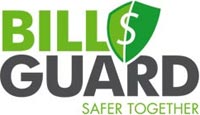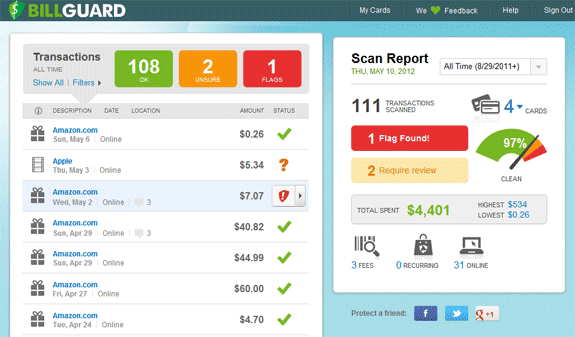When it comes to managing your money, verifying your credit card and debit card statements is an important part of the process. But how many of us really do this on a consistent basis? I know I don’t. Sure, I look through my statements, but if I see a charge that I don’t specifically remember, rarely do I do the research to verify it.
If you’re like me, BillGuard is worth checking out. It monitors all of your registered credit and debit cards for hidden charges, billing errors, and outright fraud. And the best part about it is that it’s 100% free.
How It Works
Setting up an account on BillGuard is easy. First, simply enter your email address and create a password. After that, you must enter the login information to your online credit and debit card accounts.
After the information for each account is input into the system, BillGuard runs each transaction through a series of more than 100 security tests to identify hidden charges, billing errors, scams, and fraud. Based on the results, it then categorizes your transactions as “OK,” “Unsure,” or “Flag.” From there, you can click on any individual transaction to get more details on the charge, such as the merchant, location, and payment history.
You also have the option to change the status of any of your transactions via a convenient drop-down box. If BillGuard categorizes one of your transactions as “Unsure,” but you know it’s fine, you can edit the transaction to reflect the “OK” status. BillGuard will remember this information so you won’t continually have to edit similar or recurring transactions.
For “Unsure” transactions, you can post a question about it by clicking on the “Ask other customers about this merchant” link. You will receive a response back from BillGuard once the information is available – or, you can mark it to be followed up on later. If you choose to manually flag a transaction you think may be fraudulent, BillGuard will send you an email on what steps to take next to resolve the issue.
At the end of each month, you’ll receive an email providing a quick overview of all your credit cards. But if a potentially fraudulent charge appears, you’ll be notified right away.
Key Features
- Convenience. Once you’ve connected all of your credit card and debit card accounts, you’re done – BillGuard does the rest. When viewing your BillGuard account, all of your charges appear on your homepage, along with notifications as to which charges have been marked as “Unsure” and ones that have been flagged, either by you or BillGuard.
- Email Alerts. Whenever an issue arises with one of your charges, you’ll get an email about it immediately.
- Merchant Transaction Reliability. This feature comes up whenever you click on any of your individual charges. It displays the percentage of transactions from all BillGuard subscribers that have been marked as “OK,” “Unsure,” and “Flag.”
- Filters. BillGuard gives you the option to filter your charges according to specific categories, such as an individual credit card, a dollar range, or spending category.
- Thoroughness. Each of your charges is run through more than 100 automated security tests to check for hidden charges, scams, and other forms of fraud.
Advantages
- Interactive. BillGuard is an interactive website, so whenever you flag a transaction, the information is stored on the website. When multiple flags are posted by subscribers, BillGuard notifies all members who have similar charges.
- Secure. BillGuard comes with bank-level AES 256-bit encryption security, so all your information is safe and secure. The site is also monitored daily by VeriSign and McAfee HackerSafe.
- Free. The website is 100% free – there are no hidden charges or fees, even if it spots a charge that ends up saving you hundreds of dollars. BillGuard is currently focused on collecting data and improving its algorithm, and it may add some premium paid features in the future to make money and sustain the business.
- Provides Guidance for Fraudulent Transactions. If a transaction is flagged by either you or BillGuard, the system will send you an email with the next steps to take to get your money back.
Disadvantages
- Limited Access. BillGuard can only review transactions for credit cards for which you have online access. If you want to have all your bills organized in one place, and you have accounts that are not accessible online, this could pose a problem.
- Limited Customer Support. The website has no phone support and no live chat. If you have a question, your only option is to email BillGuard or navigate the help center section of their website.
- Geographic Limitation. Currently, the website is only good for use within the United States.
Final Word
The case can be made that BillGuard provides a service that all of us should be performing on our own. However, many of us neglect to scan every credit card statement every month. In fact, according to BillGuard, 9 out of 10 people don’t perform this important task. Also, banks and credit card issuers typically catch only 30% of fraudulent charges on your card. The rest is up to you. BillGuard can help you through this process and save you time, automatically catching errors and fraudulent charges with less effort on your part.
What are your thoughts on what BillGuard has to offer?




